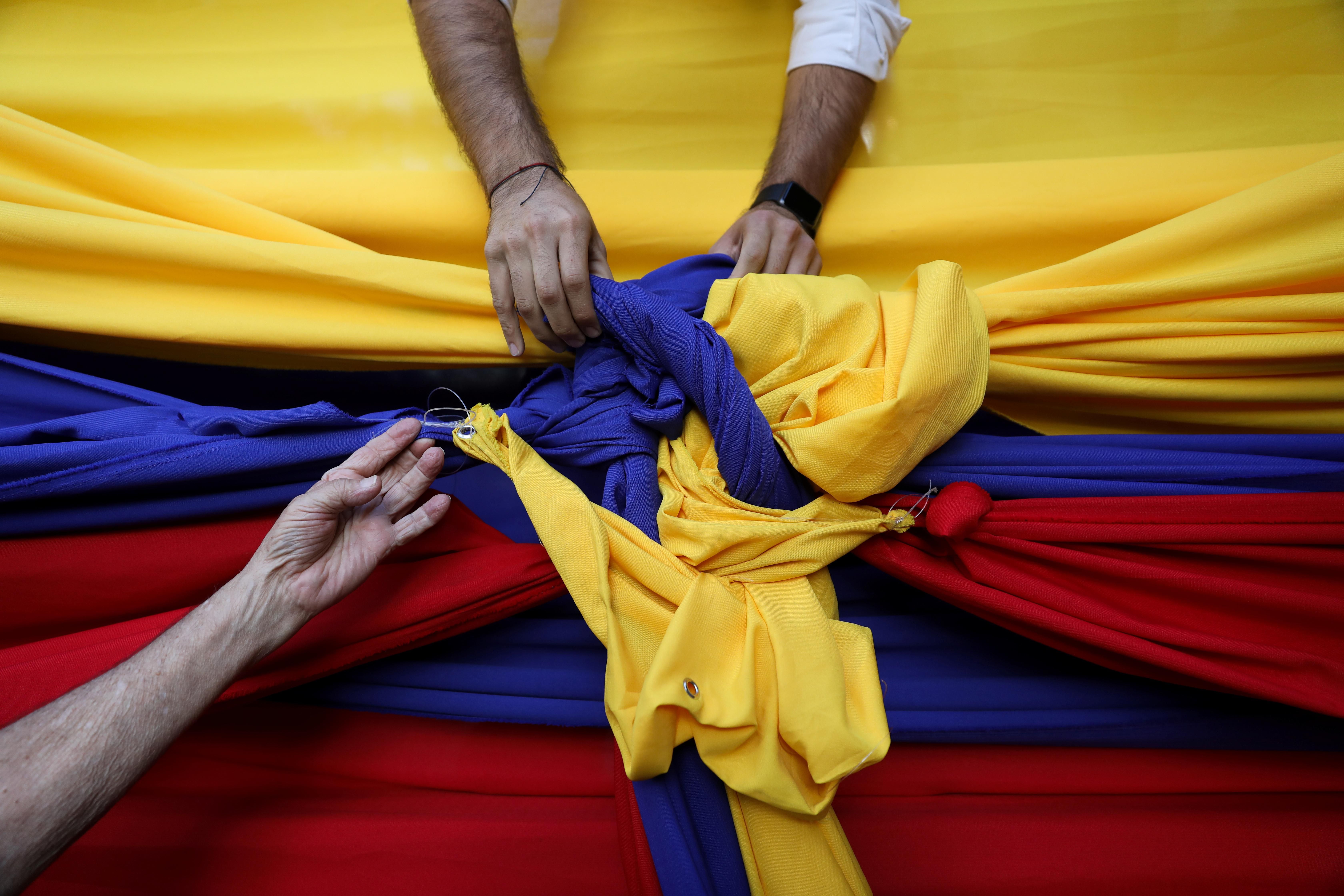December 07, 2020
For nearly two years, two men have claimed to be president in Venezuela. But after legislative elections over the weekend, one of them may finally lose out.
President Nicolás Maduro's sweeping victory in Sunday's vote will cement his grip on power, while raising big questions about the future of opposition leader Juan Guaidó, recognized by the US and other democracies as "interim president" since 2019. Guaidó and his supporters had gambled on boycotting the election because they said it would be rigged. But now, as a result, he has lost his perch as speaker of the National Assembly, and with it, his legal claim to the presidency.
What does the aftermath of the election mean for the two men vying to rule the country?
First, a bit of background. A lot has happened in Venezuela since Hugo Chávez, the country's charismatic socialist former leader, died in April 2013. When Maduro — who was Chávez's foreign minister — took over, many observers predicted the impending end of the socialist regime as the new president lacked Chávez's popularity. However, Maduro proved resilient, and crucially he kept the powerful military on his side.
Indeed, the strongman president has weathered the storm of Venezuela's staggering economic crisis — caused by his own economic mismanagement and worsened by low oil prices and US sanctions — which has turned the once prosperous nation into a basket case plagued by hyperinflation and shortages. Over 4.5 million Venezuelans have left the country in the past five years.
Maduro won a second term in 2018. But when he was inaugurated in early 2019, Guaidó declared the result illegitimate due to widespread allegations of fraud, and announced that in his capacity as speaker, he was interim president. The US, Brazil, Colombia, and other Latin American nations all recognized Guaidó's claim, while China, Cuba, Iran, and Russia did not. Since then, however, Guaidó seems to have lost his mojo.
An all-powerful president. By winning a majority in the National Assembly, Maduro's Socialist Party has now gained full control of all political institutions in Venezuela. This now secures his ability to to pass budgets, ratify international agreements, and sign deals with foreign companies.
This means, for instance, that Maduro can now spend as much as he wants on his pet development projects, sell more oil to his international allies, and inject much-needed foreign capital into PDVSA, the national oil company. Maduro hopes that these deals will help Venezuelan boost oil production to offset the impact of US sanctions on the country's single source of hard currency exports.
A powerless opposition leader. When the new parliament is inaugurated on January 5, Guaidó and his allies will be out of the National Assembly. This has both domestic and international implications.
In Venezuela, having no parliamentary representation will strip Guaidó of one of the few institutional footholds that he could use to challenge Maduro. What's more, without his claim to leadership of the body, it will become harder for him to unite the country's famously fragmented opposition — especially if he's forced into exile.
Meanwhile, big outside players like Spain — which now refers to Guaidó as the opposition leader, not "president" — have already moved on. In the US, the incoming Biden administration has yet to signal if it will continue recognizing him as Venezuela's "real" president.
What comes next? Guaidó is seeking to hold a popular referendum against Maduro's "usurpation of power." Whatever the result, the only sure thing is that Venezuela's political crisis won't end anytime soon.From Your Site Articles
More For You
Prime Minister Narendra Modi, with President of the European Council António Luís Santos da Costa, and President of the European Commission Ursula von der Leyen, at Hyderabad House, in New Delhi, India, on Jan. 27, 2026.
DPR PMO/ANI Photo
On Tuesday, the world’s largest single market and the world’s most populous country cinched a deal that will slash or reduce tariffs on the vast majority of the products they trade.
Most Popular
Sponsored posts
Five forces that shaped 2025
What's Good Wednesdays
What’s Good Wednesdays™, January 28, 2026
Mexican President Claudia Sheinbaum Pardo stands alongside Canadian Prime Minister Mark Carney and US President Donald Trump during the 2026 World Cup draw at the John F. Kennedy Center for the Performing Arts in Washington, D.C., on December 5, 2025.
Deccio Serrano/NurPhoto
Canadian Prime Minister Mark Carney has repeatedly tussled with US President Donald Trump, whereas Mexican President Claudia Sheinbaum has tried to placate him. The discrepancy raises questions about the best way to approach the US leader.
Fighters of the Qassam Brigades, the armed wing of the Palestinian Islamist Hamas movement, attend a rally marking the 35th anniversary of the group's foundation in Gaza City on December 14, 2022.
Photo by Majdi Fathi/NurPhoto
10,000: The number of Hamas officers that the militant group reportedly wants to incorporate into the US-backed Palestinian administration for Gaza, in the form of a police force.
Walmart is investing $350 billion in US manufacturing. Over two-thirds of the products Walmart buys are made, grown, or assembled in America, like healthy dried fruit from The Ugly Co. The sustainable fruit is sourced directly from fourth-generation farmers in Farmersville, California, and delivered to your neighborhood Walmart shelves. Discover how Walmart's investment is supporting communities and fueling jobs across the nation.
© 2025 GZERO Media. All Rights Reserved | A Eurasia Group media company.
